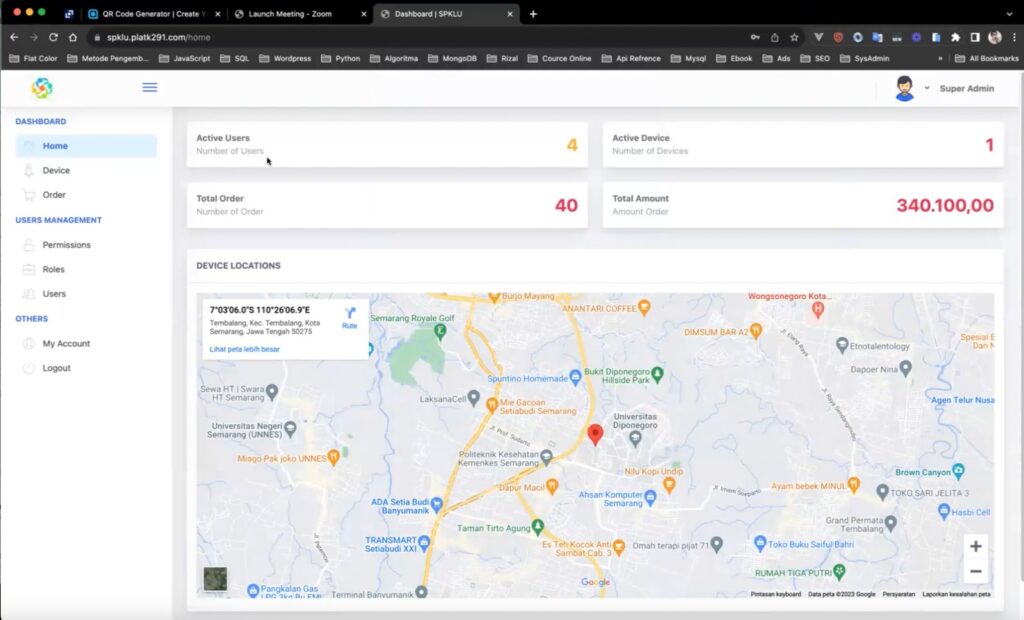The trend of electric vehicles is increasing in Indonesia. In order to support the electric vehicle ecosystem in Indonesia, a team of lecturers and students at the Politeknik Negeri Semarang (Polines) developed a Smart Monitoring and Multi E-Payment Application at the Public Electric Vehicle Charging Station (SPKLU) or known as ECAS.
With this application, it will be easier for people to charge electric car batteries. This convenience is not only because you can find out the location of the SPKLU, but also the ease of payment when charging an electric vehicle using various types of digital money (multi e-payment) which are familiar to people's daily use, such as Gopay, Shopee Pay, Quick Response Code Indonesian Standard (QRIS), and so on.
"The current problem is that the payment application is still supported by digital money (e-money) provider Link Aja so it cannot accommodate other digital money providers that are widely used by the public, such as Gopay, OVO, Dana, Shopee Pay and QRIS," said lecturer and head of the ECAS development team, Mardiyono, about the background to ECAS development.
Mardiyono, who is a lecturer at the Department of Electrical Engineering, Polines, said that multi-use e-payment is one of the advantages offered in this application. It is hoped that this will provide convenience, usefulness and flexibility in payment modes at SPKLU, especially when the Link Aja application experiences problems.
“When Link Aja experiences problems and there is no choice e-payment other, then users experience difficulty completing transaction payments. "Payment delays will also result in loss of time and value of money, both for users and business people," added Mardiyono.
The development of mobile applications based on Android and Apple iOS, continued Mardiyono, is not only used by users, but also business people/partners. With this application, business actors/partners will make it easier to monitor/monitor SPKLU business performance in various locations using it smart dashboard based monitoring cloud.
Still, according to Mardiyono, the development of this application involved an industrial partner, PT Manunggalintegra Sejahtera in Banyumanik, Semarang, Central Java. According to him, PT Manunggalintegra Sejahtera has prepared infrastructure in the form of SPKLU equipment and based servers cloud which is used for servers back end.
However, continued Mardiyono, they still face a number of obstacles, namely problems in developing the SPKLU application which includes the process of obtaining permits at the Ministry of Energy and Mineral Resources, limitations of Android and Apple iOS application developers, as well as multi-app experience. e-payment ywhich is still limited. "A single e-payment application, only Link Aja, provides limitations and even obstacles to the ease of payment transactions," added Mardiyono.
This innovation developed by Mardiyono and his team is a combination of hardware and software. Part hardware covers chargers SPKLU and system Internet of Things (IoT) for monitoring and control. Software developed in the form of user applications based on Android and Apple iOS which have standard features, such as start charging reset, charging monitoring, displaying charging duration, displaying estimated charging completion, power, SoC / Battery percentage, Transaction History – Filter On Going, displaying EV Charger Status (Connected/Disconnected)
"This application can also be used to find out the location of the SPKLU, equipped with a map to help direct you to the SPKLU location. "And don't forget, this application is also equipped with transaction security using standard encryption technology," said Mardiyono.
For information, in 2023 the number of electric cars in Indonesia will be 20,414. Meanwhile, the number of SPKLUs is only 911, most of which are located in Jakarta and are SPKLUs from PLN. It is felt that this number is not comparable to electric cars in Indonesia, so it requires the private sector to play a role in developing SPKLU application products for the public. (Nan/Cecep)
Source: vocational.kemdikbud.go.id

